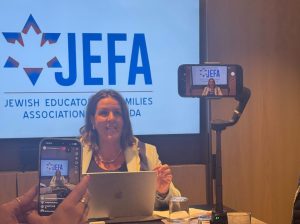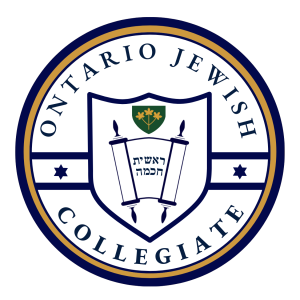 TORONTO — Andrea W. and her son are not the only ones who have faced difficult choices as a result of She’arim’s closing.
TORONTO — Andrea W. and her son are not the only ones who have faced difficult choices as a result of She’arim’s closing.
Kathy Manoim, former She’arim principal
According to Sidney Braun, co-president of She’arim – which still exists as a corporation and a charity – a group of parents have been looking into sending their children to Eitz Chaim because it is more reflective of their lifestyle.
Kathy Manoim, former She’arim principal, said there are some Orthodox parents who wanted a “more religious environment” than what’s offered by TanenbaumCHAT or Associated – two out of the three schools, along with Netivot HaTorah, that will host special programs for She’arim students this fall. Also, Manoim added, some parents wanted a less religious environment.
At She’arim, she said, children were “united by the fact they all had learning issues.” There were no expectations regarding home observance levels, although there was always “a [high] level of observance” at school, she added. Manoim will continue working with former She’arim students as supervisor of the social work program in the three schools.
Avraham Birenbaum, 10, will be returning to Eitz Chaim after a year at She’arim, in part because the school’s religious outlook is compatible with the family’s, said his mother Suzanne. She noted, however, that being with children of differing observance levels at She’arim “added a whole new positive dimension to Avraham’s life.”
Her son – who has ADHD and fine motor issues that affect his handwriting, but who is also academically gifted – doesn’t want to go through another move to a new school, and prefers to be with his friends at Eitz Chaim, she said. Suzanne noted that he has been studying Gemara with a tutor, which was not part of the She’arim curriculum.
Avraham has been accepted as a regular student at Eitz Chaim, Suzanne said.
Jana Kofler’s 12-year-old son, who is eligible for the program at Netivot, will be attending public school next year in Thornhill. The school offers “full integration, with dedicated support,” she said.
“We were looking for more integration,” added Kofler, who didn’t favour the “school-within-a-school model.”
“We decided the best value was to invest [money previously allocated to day school tuition] into private tutoring for Jewish subjects, and math and English.”
“There just isn’t a perfect solution,” Braun said. Parents who have opted for other Jewish day schools will not get the same benefits as the three designated schools, he noted.
Manoim noted that even during She’arim’s last few weeks of operation, she received calls from three or four people who were interested in enrolling their children and hadn’t heard that the school was closing.
English said that the Mercaz has been “in constant communication” with She’arim parents.
 Emily, left, and Sydney Yalowsky
Emily, left, and Sydney Yalowsky
Susan Yalowsky and her husband, Stuart, have two daughters who were She’arim students. Emily, 13, who just graduated from She’arim, is continuing on to the program at TanenbaumCHAT.
Sydney, 11, would have been accommodated at Netivot under the new plan, Yalowsky said, although the school, which is modern Orthodox, separates boys and girls in higher grades, and Sydney would have been the only girl moving to Netivot from She’arim.
Rebecca Moses, the only other girl in Sydney’s grade at She’arim who might have gone to Netivot, will attend public school next year, also in Thornhill.
Initially, Rebecca’s mother, Ann, wasn’t as positive about the public school option, but she changed her mind after meeting with staff there.
Moses added that she was planning to try private tutoring to keep up her daughter’s Hebrew. “It’s a pity I had to take her out of the system, but we have to do what’s best for them.”
“It’s been very difficult,” said Susan Yalowsky, who along with her husband weighed several options, including public school, before settling on the Toronto Heschel School.
“At this point I’m just happy to have the situation settled… I’m happy she’ll be in the Jewish system,” she said, adding that she hopes more support will be forthcoming from the federation.
“Every school has children with learning disabilities.”
Yalowsky had only positive comments about Netivot, which she said would have accommodated her daughter. Among her reasons for choosing another day school was that Netivot is “not our lifestyle,” she said.
“There’s no situation that’s perfect,” Yalowsky said. She believes, however, that closing She’arim was “a disaster” for the students.
But Joy Koplowitz, a senior psycho-educational consultant for JVS who also works at TanenbaumCHAT and Associated, said she’s “positive” about the plan that’s in place for students who were at She’arim.
She said the students she has worked with “have a lot of strengths to bring to the learning table.” She believes the biggest challenge for the schools they will be attending in the fall will be to help socially integrate them. “I think that’s the challenge they face – to create an environment where everybody’s differences are appreciated and accepted.”
“I just hope that these schools are going to find programs to socially integrate them, whether through Shabbatons or through some subjects, [such as] gym.”
Social issues are a particular challenge in middle school, she noted. Speaking in a general sense, she noted that “social differences are hard to manage” at that stage.
“It’s less likely a teacher’s going to intervene at the middle school level. Often, they don’t hear what’s going on in the hallways… I think that emotionally kids at that age are also very sensitive.”
She credited She’arim for building students’ confidence and self-esteem, but said she didn’t think the school was as strong in social integration, because “for the most part, the students have been segregated.”






